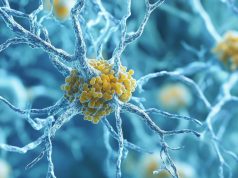Patients in the earliest stage of Alzheimer disease, with very mild symptoms, experienced the lowest risk of complications
By Lori Solomon HealthDay Reporter
THURSDAY, May 15, 2025 (HealthDay News) — Treatment of Alzheimer disease with lecanemab is feasible in a specialty memory clinic, and the frequency of significant adverse events is similar to clinical trials, according to a study published online May 12 in JAMA Neurology.
Madeline Paczynski, from the Washington University School of Medicine in St. Louis, and colleagues examined the feasibility and safety of treating patients in specialty memory clinics with lecanemab. Analysis included 234 patients with early symptomatic Alzheimer disease initiating lecanemab (Aug. 1, 2023, to Oct. 1, 2024).
The researchers found that infusion-related reactions occurred in 37 percent of patients and were typically mild. Of the 194 patients at risk for amyloid-related imaging abnormalities (ARIA), just under one-quarter (23 percent) had at least one microhemorrhage and/or superficial siderosis before initiation of lecanemab. Twenty-two percent of patients developed ARIA over an average treatment period of 6.5 months, including 15 percent who developed ARIA with edema/effusion with or without ARIA with hemorrhage/hemosiderin deposition, and 6.7 percent developed isolated ARIA with hemorrhage/hemosiderin deposition. Of those developing ARIA, 5.7 percent were symptomatic and two of 11 developed clinically severe symptoms. No patients developed a macrohemorrhage or died. Symptomatic ARIA was seen at a rate of 27 percent in patients with mild dementia and a rate of 1.8 percent for those with mild cognitive impairment or very mild dementia.
“Our study shows that WashU Medicine’s outpatient clinic has the infrastructure and expertise to safely administer and care for patients on lecanemab, including the few who may experience severe side effects, leading the way for more clinics to safely administer the drug to patients,” Barbara Joy Snider, M.D., Ph.D., also from Washington University, said in a statement.
Several authors disclosed ties to the pharmaceutical and biotechnology industries.
Copyright © 2025 HealthDay. All rights reserved.








